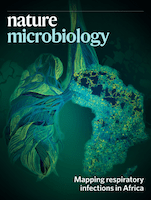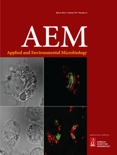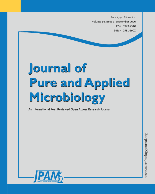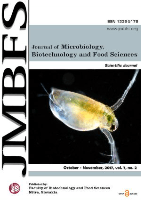
JOURNAL OF MICROBIOLOGY AND BIOTECHNOLOGY
Scope & Guideline
Leading the Charge in Microbial Discoveries
Introduction
Aims and Scopes
- Microbial Genetics and Genomics:
Research focusing on the genetic makeup of microorganisms, including gene expression, mutation analysis, and the role of plasmids and phages in microbial genetics. - Microbial Metabolism and Physiology:
Studies that examine the metabolic pathways and physiological characteristics of microorganisms, including their biochemical processes and how these can be harnessed for biotechnological applications. - Biocontrol and Bioremediation:
Exploration of microbial applications in the control of pests and diseases and the remediation of contaminated environments, emphasizing the ecological impact of these approaches. - Food Microbiology and Fermentation Technology:
Research on the role of microorganisms in food production, safety, and preservation, including studies on probiotics, fermentation processes, and foodborne pathogens. - Antimicrobial Resistance and Pathogenesis:
Investigations into the mechanisms of antimicrobial resistance in pathogenic microorganisms and the development of strategies to combat infections. - Plant-Microbe Interactions:
Studies that explore the interactions between plants and microorganisms, including the role of beneficial microbes in plant growth promotion and disease resistance. - Industrial Biotechnology:
Research on the application of microbial processes in industrial settings, including enzyme production, bioprocess optimization, and the development of sustainable biotechnological solutions.
Trending and Emerging
- Microbiome Research:
There is a growing emphasis on understanding the human microbiome and its role in health and disease, with studies exploring the interactions between gut microbiota and various physiological processes. - Synthetic Biology and Genetic Engineering:
Research in synthetic biology, particularly related to the engineering of microbial strains for improved production of bioproducts and therapeutics, is gaining momentum. - Postbiotics and Probiotics:
The exploration of postbiotics—bioactive compounds produced by probiotics—has emerged as a significant area of interest, especially regarding their health benefits and applications in functional foods. - Microbial Production of Biofuels and Bioplastics:
Research focused on the use of microorganisms for the sustainable production of biofuels and biodegradable plastics is trending as industries seek eco-friendly alternatives. - CRISPR and Genome Editing Technologies:
The application of CRISPR technology for genome editing in various microorganisms is rapidly expanding, leading to innovative approaches in microbial research and biotechnology. - Environmental Microbiology and Climate Change:
Investigations into the role of microorganisms in biogeochemical cycles and their potential for mitigating climate change through bioremediation and carbon sequestration are increasingly relevant.
Declining or Waning
- Classical Microbial Taxonomy:
Research focused on the traditional classification and identification of microorganisms has become less prominent as molecular techniques such as metagenomics and genomic sequencing have gained preference for studying microbial diversity. - Antibiotic Development from Natural Sources:
Although previously a strong focus, the exploration of natural products for new antibiotics has waned in favor of synthetic and semi-synthetic approaches, particularly in response to rising antibiotic resistance. - Basic Microbial Physiology Studies:
Fundamental studies on microbial physiology that do not directly relate to applied biotechnological outcomes are being overshadowed by more applied research that focuses on specific applications or technologies. - Studies on Non-Pathogenic Microorganisms:
Research on non-pathogenic microorganisms, while still important, has decreased in favor of studies that focus on pathogenic species and their implications for public health. - Traditional Biotechnological Applications:
Research on conventional biotechnological methods is declining as the field shifts towards more innovative approaches, including synthetic biology and metabolic engineering.
Similar Journals

APPLIED BIOCHEMISTRY AND MICROBIOLOGY
Catalyzing Progress in Applied Microbiology and Biotechnology.Applied Biochemistry and Microbiology is an esteemed journal published by Pleiades Publishing Inc, focusing on the intricate intersections of biochemistry and microbiology. Established in 1970, with a commitment to advancing scientific knowledge, this journal serves as a vital platform for disseminating innovative research findings in applied microbiology, biotechnology, and biochemistry. With its ISSN 0003-6838 and E-ISSN 1608-3024, the journal operates from its base in New York, USA. As a recognized publication in the field, Applied Biochemistry and Microbiology holds a Category Quartile ranking of Q3 in Applied Microbiology and Biotechnology and Q4 in Biochemistry, reflecting its significant contributions and relevance. Although currently not open access, the journal is indexed in Scopus, with respectable rankings that highlight its impact in the community, making it a pivotal resource for researchers and professionals dedicated to the realms of biochemistry and microbiology.

Nature Microbiology
Advancing the Frontiers of Microbial ScienceNature Microbiology is a premier journal published by NATURE PORTFOLIO that has firmly established itself within the realms of microbiological research since its inception in 2016. Based in the United Kingdom, this prestigious journal specializes in the intricacies of applied microbiology, cell biology, genetics, immunology, and medical microbiology, making it a cornerstone for academics and professionals alike. With an impressive Scopus ranking placing it in the top tier across various relevant categories—such as rank #3 in Genetics and #2 in Applied Microbiology—it underscores the journal’s commitment to high-quality, impactful research. Although it operates under a subscription model, Nature Microbiology's broad Open Access policy facilitates greater dissemination and visibility for its authors. The journal's objectives are centered around publishing cutting-edge advancements that enhance our understanding of microbial life, its interactions, and applications in health and disease. As a Q1 journal across multiple disciplines, it holds immense significance for researchers, professionals, and students enthusiastic about the latest innovations and breakthroughs in microbiology.

APPLIED AND ENVIRONMENTAL MICROBIOLOGY
Advancing Knowledge at the Intersection of Microbiology and EcologyApplied and Environmental Microbiology, published by the American Society for Microbiology, stands as a leading journal in the fields of applied microbiology and environmental science since its inception in 1976. With a prestigious Q1 quartile ranking across multiple categories including Applied Microbiology and Biotechnology, Ecology, and Food Science, this journal consistently disseminates high-impact research that drives innovation and advances our understanding of microbial interactions within our ecosystems and industries. As ranked by Scopus, it exhibits prominent rankings in various related fields, underscoring its critical role in shaping contemporary microbiological research. Researchers, professionals, and students alike can stay abreast of groundbreaking studies while contributing to a vast body of knowledge that spans diverse aspects of microbiology, biotechnology, and ecology, ultimately contributing to sustainable practices. Join the community of dedicated scholars and explore vital research findings that impact both environmental health and technological advancement.

Journal of Pure and Applied Microbiology
Pioneering Research in Pure and Applied MicrobiologyJournal of Pure and Applied Microbiology, published by DR M N KHAN, is an esteemed Open Access journal that has been dedicated to advancing the frontiers of microbiological research since its inception in 2007. Located in Bhopal, Madhya Pradesh, India, this journal presents a platform for researchers and professionals in the fields of Applied Microbiology and Biotechnology, offering insights that span a diverse range of topics critical to both scientific progress and industrial applications. As of 2023, the journal is categorized in the Q3 and Q4 quartiles, demonstrating its relevance and growing impact within the community—ranking #219 in Biochemistry, Genetics and Molecular Biology and #93 in Immunology and Microbiology. With an emphasis on accessibility, the journal has embraced an Open Access format since 2017, allowing for a wider dissemination of knowledge. By publishing high-quality research, the Journal of Pure and Applied Microbiology plays a pivotal role in fostering innovation and collaboration among researchers, students, and industry professionals alike.

Malaysian Journal of Microbiology
Connecting Research and Practice in Applied MicrobiologyMalaysian Journal of Microbiology is a prestigious open-access journal dedicated to advancing the field of microbiology, published by the Malaysian Society for Microbiology. Since its inception in 2005, this journal has become an essential platform for researchers and practitioners, facilitating the dissemination of innovative studies in applied microbiology, biotechnology, and infectious diseases. Based in Penang, Malaysia, this journal not only focuses on local microbiological research but also positions itself within the broader global scientific community. Although currently placed in the Q4 category in several relevant fields—including Applied Microbiology and Biotechnology, Infectious Diseases, and Medical Microbiology according to the 2023 Scopus rankings—it plays a crucial role in encouraging novel research and fostering collaboration among scientists. The journal encourages submissions that contribute to the understanding of microbial processes, disease mechanisms, and novel biotechnological applications, thereby supporting the continuous growth of knowledge in microbiology. With open access since its launch, the Malaysian Journal of Microbiology ensures that all published works are freely available to the public, enhancing their visibility and impact within the scientific community.

Journal of Microbiology Biotechnology and Food Sciences
Innovating solutions for a sustainable future in food and biotechnology.Journal of Microbiology Biotechnology and Food Sciences, published by SLOVAK UNIV AGRICULTURE NITRA, is a distinguished open-access journal dedicated to advancing scholarship in the interrelated fields of microbiology, biotechnology, and food sciences. With an ISSN of 1338-5178, this journal has been accessible to researchers worldwide since 2011, providing a platform for innovative studies that contribute to the understanding of microbial processes, biotechnological advancements, and food science applications. As reflected in its 2023 category quartiles, the journal holds notable positions in Biotechnology (Q3) and Food Science (Q3), and while it ranks in the lower quartiles for Microbiology (Q4) and Molecular Biology (Q4), it is committed to enhancing its impact within these domains. The journal encourages the submission of high-quality research articles, reviews, and short communications that address critical issues in these fields, making it an essential resource for academics, industry professionals, and students alike. Emphasizing both foundational research and practical applications, the Journal of Microbiology Biotechnology and Food Sciences stands as a vital contributor to the scientific discourse, fostering innovation and collaboration among researchers aiming to solve pressing challenges in food safety, biotechnology development, and microbial studies.

LETTERS IN APPLIED MICROBIOLOGY
Exploring Practical Applications of Microbial ResearchLETTERS IN APPLIED MICROBIOLOGY, published by OXFORD UNIVERSITY PRESS, is a prominent journal in the field of applied microbiology, serving as an essential platform for researchers and professionals to disseminate innovative findings. With an ISSN of 0266-8254 and an E-ISSN of 1472-765X, this peer-reviewed journal has been contributing to the scientific community since 1985 and continues to engage with cutting-edge research through 2024. With its current Scopus ranking placing it in the 45th percentile of its category, specifically at rank #70 out of 127 in the Applied Microbiology and Biotechnology field, it underscores its significance in advancing knowledge and applications pertinent to microbial science. Although it is not open access, LETTERS IN APPLIED MICROBIOLOGY offers comprehensive insights aimed at enhancing the understanding of microbiological phenomena in practical scenarios, making it a valuable resource for both seasoned experts and emerging scholars.

Current Research in Microbial Sciences
Fostering Excellence in Microbial Science ScholarshipCurrent Research in Microbial Sciences is a distinguished peer-reviewed journal published by Elsevier, focusing on the dynamic and rapidly advancing fields of microbiology and infectious diseases. With an ISSN of 2666-5174, this journal has established itself as an essential resource for researchers, professionals, and students alike, offering the latest findings and insights from 2020 to 2024. The journal holds a significant position in the academic landscape, achieving a Q2 ranking across multiple categories, including Immunology and Microbiology, Infectious Diseases, and Medical Microbiology, demonstrating its impact in these critical areas of study. With impressive Scopus rankings—such as being placed in the 94th percentile for Immunology and Microbiology—current research is well-supported by a thriving scientific community. Although the journal is not open access, it serves as a vital platform for disseminating high-quality research and fostering collaboration within the microbial sciences. Engaging with this journal enables professionals and researchers to stay abreast of innovations and contribute to the collective body of knowledge that shapes our understanding of microbial interactions and infectious diseases.

APPLIED MICROBIOLOGY AND BIOTECHNOLOGY
Transforming challenges into biotechnological solutions.Applied Microbiology and Biotechnology, an esteemed journal published by Springer, serves as a vital resource in the domains of microbiology and biotechnology. With an impressive impact factor reflecting its quality, the journal holds Q1 rankings in various categories including Applied Microbiology and Biotechnology, Biotechnology, and Medicine (Miscellaneous) as of 2023. Spanning the years from 1984 to 2024, it underscores its commitment to disseminating groundbreaking research that addresses pressing challenges in health, agriculture, and environmental sustainability. The journal is rigorously indexed and holds respectable positions in Scopus rankings, notably within the top 15% of Applied Microbiology and Biotechnology and the top 15% in Biochemistry, Genetics, and Molecular Biology. Although it is not Open Access, its comprehensive articles, reviews, and short communications are indispensable for researchers, professionals, and students eager to advance their understanding and application of microbial processes and biotechnological innovations in real-world contexts.

ANNALS OF MICROBIOLOGY
Fostering collaboration in cutting-edge microbiological research.ANNALS OF MICROBIOLOGY is a prestigious journal dedicated to advancing the field of microbiological research, published by BMC, renowned for its commitment to providing open access to vital scientific findings. With its ISSN 1590-4261 and E-ISSN 1869-2044, this journal provides a platform for the dissemination of high-quality research since its inception in 1997. Renowned for its rigorous peer-review process, it has attained a commendable Q2 ranking in the Applied Microbiology and Biotechnology category in 2023, reflecting its significant contributions to the discipline. Positioned within the 67th percentile among its peers in Scopus rankings, ANNALS OF MICROBIOLOGY continues to facilitate the exchange of innovative ideas and methodologies, serving as an essential resource for researchers, professionals, and students alike. The journal covers a broad spectrum of topics, emphasizing the intersection of microbiology with applied sciences, thereby fostering an environment that encourages collaboration and advancement in this vital field. Scholars seeking to stay at the forefront of microbiological studies will find ANNALS OF MICROBIOLOGY an invaluable addition to their academic pursuits.